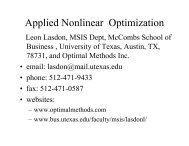[PDF] ALIO Back Matter
[PDF] ALIO Back Matter
[PDF] ALIO Back Matter
You also want an ePaper? Increase the reach of your titles
YUMPU automatically turns print PDFs into web optimized ePapers that Google loves.
MD01<br />
Monday, 4:20pm - 5:50pm<br />
■ MD01<br />
Aula Magna- First Floor<br />
Tutorial: An Overview of Humanitarian<br />
(Operations) Research<br />
Cluster: Tutorials<br />
Invited Session<br />
Chair: Luk N. Van Wassenhove, Professor, INSEAD, Technology<br />
Management, Blvd de Constance, Fontainebleau Cedex, 77305, France,<br />
luk.van-wassenhove@insead.edu<br />
1 - An Overview of Humanitarian (Operations) Research<br />
Luk N. Van Wassenhove, Professor, INSEAD, Technology<br />
Management, Blvd de Constance, Fontainebleau Cedex, 77305,<br />
France, luk.van-wassenhove@insead.edu<br />
Recent events have made it perfectly clear that both the frequency and intensity of<br />
humanitarian disasters have increased. The year 2005 has been a particularly dark<br />
one in terms of number of people killed or otherwise affected (tsunami, Katrina,<br />
Pakistan, Darfur). In Indonesia, one-third of the relief supplies were still blocked at<br />
the airport three months after the tsunami, while in Pakistan one million people<br />
were still waiting for winter tents more than a month after the earthquake. Similar<br />
challenges were faced in Haiti in early 2010. At the core of these are fundamental<br />
supply chain management problems (bottlenecks, procurement issues, tracking and<br />
tracing problems). The world of humanitarian disaster logistics is different from the<br />
familiar context of business logistics. Humanitarians operate in very dynamic<br />
environments and need to preserve a humanitarian space (respecting the principles<br />
of impartiality, neutrality and humanity). This space is increasingly challenged by<br />
political and military forces, to the point that security of humanitarian personnel<br />
has become a key concern. Since traditional funding sources are declining, and<br />
natural and man-made disasters become more frequent, humanitarian organizations<br />
realize that they will have to increasingly rely on private organizations for help.<br />
Simultaneously, companies in search for a coherent corporate social responsibility<br />
agenda, increasingly turn to the humanitarian world. However, it is far from<br />
obvious how private companies and humanitarian organizations can effectively<br />
work together in disaster relief. This presentation will introduce supply chain<br />
management in the humanitarian context, and outline the need for better<br />
preparedness and response to disasters. We also discuss opportunities for more<br />
effective collaboration among humanitarian organizations, as well as between<br />
humanitarians and private organizations. The presentation uses a number of real<br />
cases to highlight opportunities to do interesting research with a high potential<br />
impact.<br />
<strong>ALIO</strong> / INFORMS International – 2010<br />
■ MD02<br />
Salón Rojo- First Floor<br />
OR Applications for Public Policy Assesment in<br />
Developing Countries II<br />
Cluster: OR for Development and Developing Countries<br />
Invited Session<br />
Chair: Claudia Rave, Researcher, PhD Candidate, National University of<br />
Colombia, Medellín, Carrera 80 # 65-223, Bl M8A, of 309, Medellín, An,<br />
574, Colombia, claudia.rave@gmail.com<br />
1 - Spatial Scenario Analysis for Traffic Police Operation in<br />
Medellín - Colombia<br />
Rafael Nanclares, Alcaldía de Medellin, Secretaria de Transportes y<br />
Tránsito, Carrera 64C No. 72 - 58, barrio Caribe, Medellín, Colombia,<br />
rafael.nanclares@medellin.gov.co, Erika Perez<br />
OR methodologies were implemented to support the mobility authorities of<br />
Medellín city on scheduling and management of traffic police operation. The<br />
integrated approach, analyzes the requirements and demands of traffic and<br />
transportation services in the city for three scenarios, and offers results regarding<br />
operation parameters such as number of traffic police agents, their spatial<br />
distribution and time table scheduling.<br />
2 - Traffic Assignment Modeling for Scenario Analysis of Travel Times<br />
in Medellin Metropolitan Area<br />
Laura Lotero, Researcher, MSc. Student, National University of<br />
Colombia, Medellin, Carrera 80 # 65-223, Medellín, Colombia,<br />
llotero0@unal.edu.co, Patricia Jaramillo, Claudia Rave<br />
An application of the traffic assignment problem was developed as a part of a<br />
prospective modeling platform for urban externality analysis. Due to the road<br />
network design, the application allows detailed scenario analysis of public integrated<br />
transport systems in the conurbated cities, Metro, Metro-cable, rapid buses and<br />
regular buses, and offers indicators of average travel times to every urban important<br />
infrastructure services. A decomposition algorithm is implemented for sub regions<br />
analysis.<br />
68<br />
3 - Modeling Approach for Qualifying, Management and Planning of<br />
Urban Services Networks<br />
Claudia Rave, Researcher, PhD Candidate, National University of<br />
Colombia, Medellín, Carrera 80 # 65-223, Bl M8A, of 309, Medellín,<br />
An, 574, Colombia, claudia.rave@gmail.com, Juan Esteban Restrepo,<br />
Elizabeth Zapata, Patricia Jaramillo<br />
A novel spatially disaggregated approach to study urban services was developed to<br />
support decision making on management and planning of urban infrastructure<br />
provision. Proposes the analysis of the components of urban systems as networks to<br />
study its attributes, feedbacks and externalities. The analysis offers 3 main<br />
indicators, distribution, connectivity and accessibility; for facilities, public space,<br />
household, industry, and mobility systems. It allows deficit-opportunity scenario<br />
analysis.<br />
4 - Technology and Operational Improvement in Micro-retailing<br />
Margaret Pierson, Columbia University, 3022 Broadway, New York,<br />
NY, United States of America, mpierson05@gsb.columbia.edu,<br />
Garrett van Ryzin, Awi Federgruen<br />
Frogtek is a social venture whose goal is to provide micro-retailers in Latin America<br />
with cell-phone-based technology to improve their in-store and supply chain<br />
operations. In this talk, we survey the micro-retailer business environment and the<br />
operational challenges facing micro-retailers in developing economies. We then<br />
discuss research results for one problem faced by micro retailers, namely jointly<br />
managing cash and inventory.<br />
■ MD03<br />
Auditorio- First Floor<br />
Teaching Effectiveness Colloquium IV<br />
Cluster: Teaching Effectiveness Colloquium<br />
Invited Session<br />
Chair: Mariana Funes, Professor Adjunto, Universidad Nacional de<br />
Córdoba, Lote 8 Mzana Q - Los Cielos Valle Escond, Córdoba, 5003,<br />
Argentina, mfunes311@gmail.com<br />
1 - Using Classroom Games to Support the Learning Process<br />
Mariana Funes, Professor Adjunto, Universidad Nacional de<br />
Córdoba, Lote 8 Mzana Q - Los Cielos Valle Escond, Córdoba, 5003,<br />
Argentina, mfunes311@gmail.com<br />
Playing games is a learning activity. When pedagogically oriented, it contributes to<br />
significant learning opportunities. During this workshop I will present games I used<br />
with undergraduate students in Operations Research lectures. These games were<br />
developed in order to foster the students’active participation and peer-teacher<br />
interaction, pretending to contribute to the acquisition of the contents taught in an<br />
entertaining and motivating way. The audience will be invited to participate in a<br />
sample experience.<br />
■ MD04<br />
Salón Azul- First Floor<br />
Optimization Software II<br />
Sponsor: Optimization: Practice and Software of OR/MS<br />
Sponsored Session<br />
Chair: Zsolt Csizmadia, Lead Engineer, FICO, 64 Trinity Street,<br />
Leamington Spa, CV32 5YN, United Kingdom, ZsoltCsizmadia@fico.com<br />
Co-Chair: Bjarni Kristjansson, President, Maximal Software, Inc., 933 N.<br />
Kenmore St., Suite 218, Arlington, VA, 22201, United States of America,<br />
bjarni@maximalsoftware.com<br />
1 - Solving Large Scale Optimization Problems with FICO Xpress<br />
Oliver Bastert, FICO, Germany, OliverBastert@fico.com<br />
Even with the most advanced solver technology industry scale optimization<br />
problems often cannot be solved due to their size, their complexity or the limited<br />
amount of time available. We will study a couple of examples and discuss how<br />
Xpress-Mosel can be used to tackle large and difficult optimization problems by<br />
decomposition.<br />
2 - Solving Real-world Mixed Integer Quadratic Problems<br />
Zsolt Csizmadia, Lead Engineer, FICO, 64 Trinity Street, Leamington<br />
Spa, CV32 5YN, United Kingdom, ZsoltCsizmadia@fico.com<br />
Solving industrial scale mixed integer quadratic programming (MIQP) problems<br />
became one of the drivers for commercial MIQP solver development through<br />
applications arising e.g. in finance or in the energy sector. The talk will summarize<br />
some recent algorithmic improvements and numerical behavior with respect to<br />
different problem types comming from applications, including possible approaches<br />
to special and general non-convex cases.


![[PDF] ALIO Back Matter](https://img.yumpu.com/17932960/48/500x640/pdf-alio-back-matter.jpg)
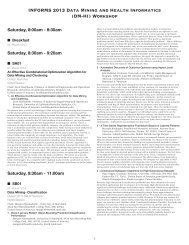
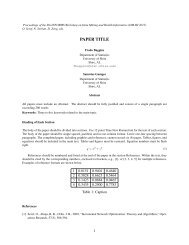
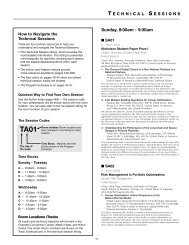
![[PDF] Charlotte Back Matter](https://img.yumpu.com/17933057/1/190x245/pdf-charlotte-back-matter.jpg?quality=85)
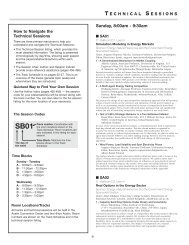
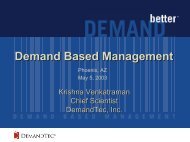
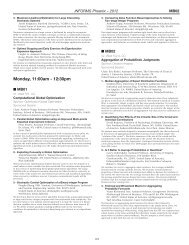

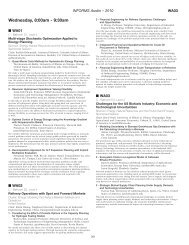
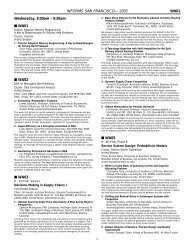
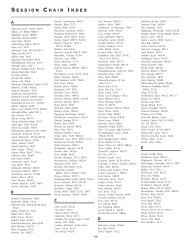
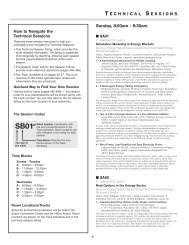
![[PDF] Monday, 8:00am - 9:30am](https://img.yumpu.com/17932954/1/190x245/pdf-monday-800am-930am.jpg?quality=85)
